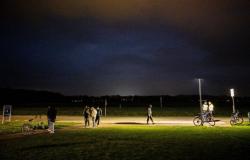Psychiatrist Manon Hillegers remembers sitting at the kitchen table and looking at her own children. Her daughter would skip her final exams and her normally sporty sons were at home. “I heard the same stories from friends and thought: all young people are now a risk group. You do not have to have family problems or be chronically ill. Everyone has a risk, because we live in a risky, scary time.”
That year, Hillegers, head of the child psychiatry department at Erasmus MC, would conduct research into the mental well-being of young people during the lockdowns. The corona crisis turned the lives of most Dutch people upside down, but for scientists like Hillegers the pandemic also offered a unique opportunity. When the government announced at the end of March 2020 that it would release 42 million euros for research into the most urgent corona questions, many hundreds of researchers dived behind their computer screens to write a subsidy application.
In addition to money for research into the social effects of the corona measures, subsidies were provided for fundamental studies into the nature of the virus itself and for medical research into treatment methods. Now that the studies have been completed and the scientific findings have been published, five Rotterdam researchers and the program director of ZonMw look back. What have the projects achieved for the researchers and what can we learn from the way the money was distributed?
No time for syrupiness
Normally, a subsidy round at ZonMw takes several months to three-quarters of a year. First, an application ends up with a committee that provides advice on whether to further develop the application or to abandon participation. The detailed application is then assessed by experts in the field. The submitter is given the opportunity to respond to their assessment, after which a ZonMw committee makes a final assessment. “It all happens at a leisurely pace, where no one gets overworked and everyone has the time to do their work properly,” says Hannie Bonink, director of programs at ZonMw at the time.
The working method is intended to distribute the subsidies as fairly as possible and to ensure that quality takes precedence over having the right contacts. There was no time for protocols during the pandemic.
“In the very first phase of our COVID program (end of March 2020, EV), we set up expert groups to advise us on what really needed to be done immediately and who could do it,” says Bonink. “Normally everyone gets the opportunity to submit, but now experts said: this has to be sorted out and then you have to have it. We had already made the first awards in April. That was completely different from what we normally do, but we couldn’t take more time for it.”
Lack of time also affected the applicants. Of the scientists who responded to the very first request for research proposals, many report rushing to type out a request in a matter of days, or even hours. These often concerned studies that were already going to take place, albeit in a slightly different form.
“We had been working for some time to develop a mobile phone application for young people with many problems,” says Hillegers, for example. “The Growit! app was delivered when the corona pandemic emerged and focused on identifying emotional problems. At the same time, there is an intervention to help young people develop resilience with all kinds of assignments.” Hillegers and its project partners decided to make the app available to all young people, not just the usual risk group.
read more
Corona science: Young people gain insight into their mental well-being via an app
During the corona pandemic, scientists from all kinds of disciplines are conducting research into…
Social epidemiologist Joost Oude Groeniger from the Erasmus School of Social and Behavioral sciences (ESSB) was already working on a long-term study with questionnaires, including trust in government agencies. The last questionnaire would be administered in March 2020. “And then the pandemic suddenly arrived, with the first lockdown in mid-March. We were presented with a unique natural experiment.” Because some respondents completed the survey shortly before and others shortly after the lockdown, the scientists were able to measure the direct effect of the lockdown.
Unfair
As the SARS-CoV 2 virus raged through the Dutch population, Marion Koopmans, head of the virology department at Erasmus MC, made every effort to find out how the virus developed genetically. The findings were of direct importance to the Outbreak Management Team. However, the large scale on which this research could take place was not self-evident: Koopmans also had to apply for a subsidy.
“I don’t have basic funding for the standard questions for every outbreak. From bird flu to monkeypox, that research must all come from grant applications. Fortunately, I still had some money left and we received support from the Erasmus MC Foundation. This allowed us to start already.” Because not all scientists are so well off, the professor advocates a structural cash reserve to fund essential research during crisis situations.
Immediately after the start of the first subsidy round, there was also criticism from scientists who did not have time to write an application in a hurry. Old Groeniger remembers such comments from colleagues on social media. “You heard complaints especially from female colleagues. They said: ‘That’s all well and good, NWO, but that makes it difficult for people with caring responsibilities.’ Afterwards it left a bad taste in my mouth, but at the time there was no time to think about it.”
What Koopmans finds particularly galling is that a year later the government spent almost a billion euros on Testing for Access, a much-criticized research pilot that went ahead thanks to a powerful business lobby. “When you see how many hoops scientists have to jump through to raise a tiny fraction of that amount. I thought it was really blown out of all proportion.”
Too little too late
Jacco van Sterkenburg and Anne-Mette Hermans from the Ersamus School of History, Culture and Communication (ESHCC) encouraged young people to take photos of their world during the lockdowns: keys in a closed door, an untouched hockey stick, crates of beer in a student house . In-depth interviews about the images mainly showed the emptiness and loneliness that many young people felt. Although he is enthusiastic about the results and the sometimes suddenly started collaborations, he also has doubts about the effectiveness of some corona projects. “The money sometimes seemed to be distributed on an ad hoc basis and I wonder whether there was much insight into the relevance of all the research. I have been to conferences after the pandemic where people presented their findings from multi-year corona studies. There was little interest in that, because it was mustard after the meal. It is especially useful to share interim results that can be useful to policymakers.”
Happiness researcher Martijn Hendriks from the Erasmus School of Economics (ESE) can imagine this. He tested the effectiveness of measures to improve the mental well-being of healthcare workers. It turned out to be better to strive together for a desired situation than to brainstorm about problems. He discovered the usefulness of rapid, interim feedback of results. “We did action research. You measure the effect of an intervention in the short term, after which you can adjust the policy in the meantime. At the university we normally do a pre-measurement and a post-test with a control group, but this way you can directly contribute to the well-being of employees.”
Boost for science
Most of those involved agree that the distribution system has weaknesses. At the same time, the corona subsidies have had a particularly positive effect on the research of most scientists that Erasmus Magazine spoke to.
For example, Hendriks says that he has had more opportunities than usual to disseminate his research results. The research into coronaviruses and immunity from the Rotterdam virology department received a strong rating boost and studies surrounding Hillegers’ mental well-being app also gained momentum. There are now four scientific publications about the app and one major one Flagship-subsidy for follow-up research has been received. “We will further develop the tools and focus on the prevention of mental problems in young people from the general population. That wouldn’t have happened without the pandemic.”
Hannie Bonink of ZonMw proudly reflects on the amount of work they have done during the corona period, although she acknowledges that not everything went perfectly. “There was a lot of mutual trust that we were doing good things together. Normally ZonMw is a pot full of money that is not easy to access. People do all kinds of things to bring their research to our attention and we ask critical questions: why is this the most important thing? But during the corona period you felt that we all had the same interest: doing good research into Covid-19.”
read more
Corona science: ‘It was actually by coincidence that we started this research’
During the corona pandemic, scientists from all kinds of disciplines are conducting research into…
Where did all the subsidies end up?
It is difficult to create a clear overview of subsidy amounts per research institution. According to a website with 190 subsidized COVID-19 projects from ZonMw, Erasmus MC was the main applicant for 17 projects and Erasmus University for 14 projects. Of the 33 projects that the NWO honored in the first half of 2020, 2 projects came from Erasmus MC and 6 from EUR. EUR seems to be head and shoulders above the other universities, but these numbers do not say everything: the main applicant is often part of a consortium, with each partner receiving part of the money. In addition, ZonMw and NWO were not the only subsidy providers: the European Union, the Ministry of Health, Welfare and Sport and other fund providers also helped the universities. There is no central overview and although Erasmus MC itself has a list of subsidies received, this does not apply to EUR.







